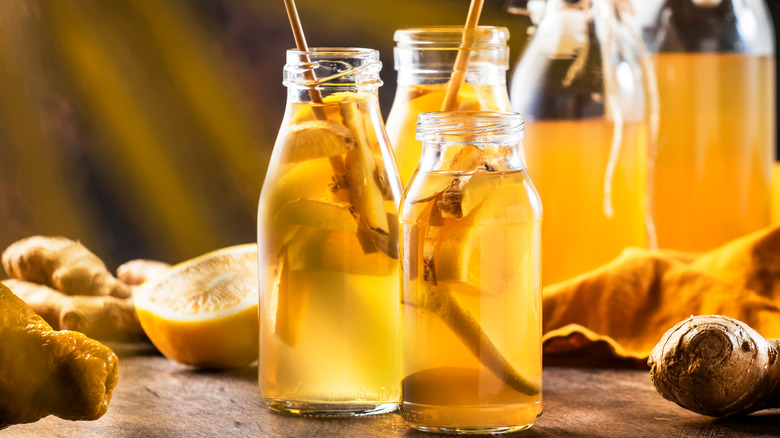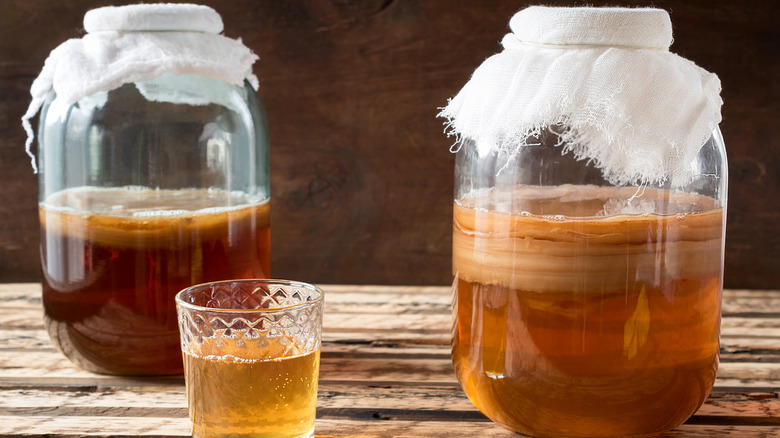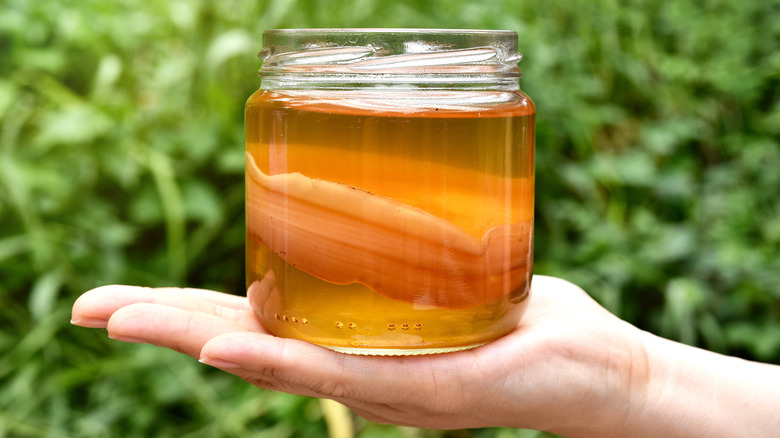Read This Before Taking Another Sip Of Homemade Kombucha
You've probably noticed the growing popularity of kombucha. Even though this fermented tea beverage with conspicuous amounts of alcohol, an odd smell, and blobs floating around is not the most appealing drink to many in terms of taste or appearance, Forbes reported in August 2020 that sales of hard kombucha had risen from $1.7 million in 2017 to more than $12 million in 2019. It may have a lot to do with kombucha's supposed health benefits. Healthline says that while scientific evidence for kombucha's health benefits is limited and requires more study, there is no doubt that it does have all the benefits of drinking tea and probiotics that are used in the making of kombucha.
Its supposed health benefits might be enough to convert you into a kombucha fan, but its hefty price tag may cause you to wonder whether making your own batch of kombucha at home is a more viable option. It's just fermented tea, after all — how hard can it possibly be? How Stuff Works says that a lot can go wrong when making kombucha at home.
Store-bought kombucha is prepared with great care
Making a batch of kombucha seems to be quite simple at first. A mixture of bacteria and yeast is added to black or green tea sweetened with sugar, and is left to ferment, usually for about a week (via NPR). During the fermentation period, "a symbiotic colony of bacteria and yeast," also called SCOBY, forms, which converts sugars in the drink to vinegar. The vinegar, Healthline says, is responsible for carbonating the drink and producing some amount of alcohol in it.
How Stuff Works says that store-bought kombucha is made in controlled and sterile conditions to ensure that no bacteria that is harmful mixes with the good bacteria that is supposed to be in kombucha. When making it at home, harmful bacteria and mold can easily contaminate the kombucha if the environment isn't sterilized properly. The site says that mold can be toxic and in some cases possibly cause cancer too, especially if you have a weaker immune system. They also warn that using the right equipment to make and store your kombucha is very important. Ceramic pots, for example, are a bad idea because they say that the acid in the drink reacts with the lead in the ceramic, consequently contaminating your kombucha with harmful toxins.
Homemade kombucha can be fatal
You may think at this point that if you sterilize your kitchen and use the correct equipment, you should be all set to brew a batch of kombucha at home. However, there is still a great risk in doing so. Take this case: Two women in 1995 made a batch of kombucha using the same mother culture (via How Stuff Works). They were both found to have gone into a cardiac arrest, after which one of them died. While no direct connection was established between their illness and kombucha, researchers suggest that the deaths may have been caused due to kombucha reacting badly with an underlying condition.
In fact, brewing and storing kombucha can be such a tricky matter that even Whole Foods got into some trouble a few years ago (via Mother Jones). Since kombucha has some alcohol, the result of fermentation, if the fermentation process isn't stopped correctly, the kombucha will continue to ferment and the alcohol level in it will continue to increase. So was the case with Whole Foods when they voluntarily decided to take off kombucha from their shelves. There was concern that the alcohol level in their kombucha had well surpassed the legal limit of 0.3%. If Whole Foods can get into trouble with their kombucha, it's best to be cautious if you decide to make your own at home.


